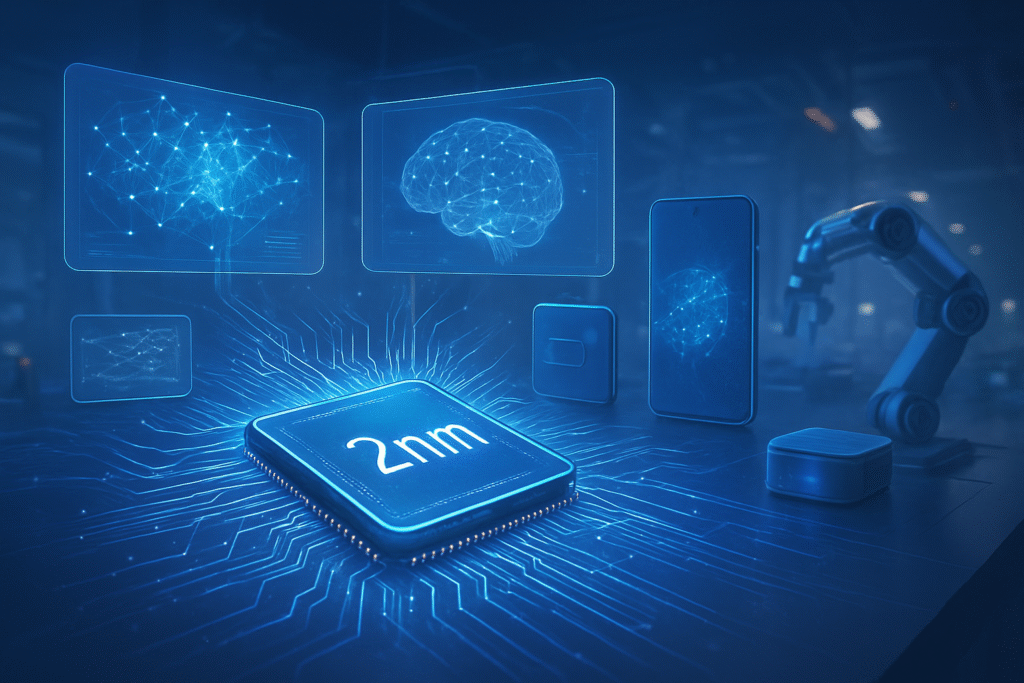
Seoul, South Korea – November 5, 2025 – Samsung Electronics (KRX: 005930) has once again cemented its position at the vanguard of technological advancement, earning multiple coveted CES® 2026 Innovation Awards from the Consumer Technology Association (CTA)®. This significant recognition, announced well in advance of the prestigious consumer electronics show slated for January 7-10, 2026, in Las Vegas, underscores Samsung’s unwavering commitment to pioneering transformative technologies, particularly in the critical fields of artificial intelligence and semiconductor innovation. The accolades not only highlight Samsung's robust pipeline of future-forward products and solutions but also signal the company's strategic vision to integrate AI seamlessly across its vast ecosystem, from advanced chip manufacturing to intelligent consumer devices.
The immediate significance of these awards for Samsung is multifaceted. It powerfully reinforces the company's reputation as a global leader in innovation, generating considerable positive momentum and brand prestige ahead of CES 2026. This early acknowledgment positions Samsung as a key innovator to watch, amplifying anticipation for its official product announcements and demonstrations. For the broader tech industry, Samsung's consistent recognition often sets benchmarks, influencing trends and inspiring competitors to push their own technological boundaries. These awards further confirm the continued importance of AI, sustainable technology, and connected ecosystems as dominant themes, providing an early glimpse into the intelligent, integrated, and environmentally conscious technological solutions that will define the near future.
Engineering Tomorrow: Samsung's AI and Semiconductor Breakthroughs
While specific product details for the CES® 2026 Innovation Awards remain under wraps until the official event, Samsung's consistent leadership and recent advancements in 2024 and 2025 offer a clear indication of the types of transformative technologies likely to have earned these accolades. Samsung's strategy is characterized by an "AI Everywhere" vision, integrating intelligent capabilities across its extensive device ecosystem and into the very core of its manufacturing processes.
In the realm of AI advancements, Samsung is pioneering on-device AI for enhanced user experiences. Innovations like Galaxy AI, first introduced with the Galaxy S24 series and expanding to the S25 and A series, enable sophisticated AI functions such as Live Translate, Interpreter, Chat Assist, and Note Assist directly on devices. This approach significantly advances beyond cloud-based processing by offering instant, personalized AI without constant internet connectivity, bolstering privacy, and reducing latency. Furthermore, Samsung is embedding AI into home appliances and displays with features like "AI Vision Inside" for smart inventory management in refrigerators and Vision AI for TVs, which offers on-device AI for real-time picture and sound quality optimization. This moves beyond basic automation to truly adaptive and intelligent environments. The company is also heavily investing in AI in robotics and "physical AI," developing advanced intelligent factory robotics and intelligent companions like Ballie, capable of greater autonomy and precision by linking virtual simulations with real-world data.
The backbone of Samsung's AI ambitions lies in its semiconductor innovations. The company is at the forefront of next-generation memory solutions for AI, developing High-Bandwidth Memory (HBM4) as an essential component for AI servers and accelerators, aiming for superior performance. Additionally, Samsung has developed 10.7Gbps LPDDR5X DRAM, optimized for next-generation on-device AI applications, and 24Gb GDDR7 DRAM for advanced AI computing. These memory chips offer significantly higher bandwidth and lower power consumption, critical for processing massive AI datasets. In advanced process technology and AI chip design, Samsung is on track for mass production of its 2nm Gate-All-Around (GAA) process technology by 2025, with a roadmap to 1.4nm by 2027. This continuous reduction in transistor size leads to higher performance and lower power consumption. Samsung's Advanced Processor Lab (APL) is also developing next-generation AI chips based on RISC-V architecture, including the Mach 1 AI inference chip, allowing for greater technological independence and tailored AI solutions. Perhaps most transformative is Samsung's integration of AI into its own chip fabrication through the "AI Megafactory." This groundbreaking partnership with NVIDIA involves deploying over 50,000 NVIDIA GPUs to embed AI throughout the entire chip manufacturing flow, from design and development to automated physical tasks and digital twins for predictive maintenance. This represents a paradigm shift towards a "thinking" manufacturing system that continuously analyzes, predicts, and optimizes production in real-time, setting a new benchmark for intelligent chip manufacturing.
The AI research community and industry experts generally view Samsung's consistent leadership with a mix of admiration and close scrutiny. They recognize Samsung as a global leader, often lauded for its innovations at CES. The strategic vision and massive investments, such as ₩47.4 trillion (US$33 billion) for capacity expansion in 2025, are seen as crucial for Samsung's AI-driven recovery and growth. The high-profile partnership with NVIDIA for the "AI Megafactory" has been particularly impactful, with NVIDIA CEO Jensen Huang calling it the "dawn of the AI industrial revolution." While Samsung has faced challenges in areas like high-bandwidth memory, its renewed focus on HBM4 and significant investments are interpreted as a strong effort to reclaim leadership. The democratization of AI through expanded language support in Galaxy AI is also recognized as a strategic move that could influence future industry standards.
Reshaping the Competitive Landscape: Impact on Tech Giants and Startups
Samsung's anticipated CES® 2026 Innovation Awards for its transformative AI and semiconductor innovations are set to significantly reshape the tech industry, creating new market dynamics and offering strategic advantages to some while posing considerable challenges to others. Samsung's comprehensive approach, spanning on-device AI, advanced memory, cutting-edge process technology, and AI-driven manufacturing, positions it as a formidable force.
AI companies will experience a mixed impact. AI model developers and cloud AI providers stand to benefit from the increased availability of high-performance HBM4, enabling more complex and efficient model training and inference. Edge AI software and service providers will find new opportunities as robust on-device AI creates demand for lightweight AI models and privacy-preserving applications across various industries. Conversely, companies solely reliant on cloud processing for AI might face competition from devices offering similar functionalities locally, especially where latency, privacy, or offline capabilities are critical. Smaller AI hardware startups may also find it harder to compete in high-performance AI chip manufacturing given Samsung's comprehensive vertical integration and advanced foundry capabilities.
Among tech giants, NVIDIA (NASDAQ: NVDA) is a clear beneficiary, with Samsung deploying 50,000 NVIDIA GPUs in its manufacturing and collaborating on HBM4 development, solidifying NVIDIA's dominance in AI infrastructure. Foundry customers like Qualcomm (NASDAQ: QCOM) and MediaTek (TPE: 2454), which rely on Samsung Foundry for their mobile SoCs, will benefit from advancements in 2nm GAA process technology, leading to more powerful and energy-efficient chips. Apple (NASDAQ: AAPL), Google (NASDAQ: GOOGL), and Microsoft (NASDAQ: MSFT), also heavily invested in on-device AI, will see the entire ecosystem pushed forward by Samsung's innovations. However, competitors like Intel (NASDAQ: INTC) and TSMC (NYSE: TSM) will face increased competition in leading-edge process technology as Samsung aggressively pursues its 2nm and 1.4nm roadmap. Memory competitors such as SK Hynix (KRX: 000660) and Micron (NASDAQ: MU) will also experience intensified competition as Samsung accelerates HBM4 development and production.
Startups will find new avenues for innovation. AI software and application startups can leverage powerful on-device AI and advanced cloud infrastructure, fueled by Samsung's chips, to innovate faster in areas like personalized assistants, AR/VR, and specialized generative AI applications. Niche semiconductor design startups may find opportunities in specific IP blocks or custom accelerators that integrate with Samsung's advanced processes. However, hardware-centric AI startups, particularly those attempting to develop their own high-performance AI chips without strong foundry partnerships, will face immense difficulty competing with Samsung's vertically integrated approach.
Samsung's comprehensive strategy forces a re-evaluation of market positions. Its unique vertical integration as a leading memory provider, foundry, and device manufacturer allows for unparalleled synergy, optimizing AI hardware from end-to-end. This drives an intense performance and efficiency race in AI chips, benefiting the entire industry by pushing innovation but demanding significant R&D from competitors. The emphasis on robust on-device AI also signals a shift away from purely cloud-dependent AI models, requiring major AI labs to adapt their strategies for effective AI deployment across a spectrum of devices. The AI Megafactory could also offer a more resilient and efficient supply chain, providing a competitive edge in chip production stability. These innovations will profoundly transform smartphones, TVs, and other smart devices with on-device generative AI, potentially disrupting traditional mobile app ecosystems. The AI Megafactory could also set new standards for manufacturing efficiency, pressuring other manufacturers to adopt similar AI-driven strategies. Samsung's market positioning will be cemented as a comprehensive AI solutions provider, leading an integrated AI ecosystem and strengthening its role as a foundry powerhouse and memory dominator in the AI era.
A New Era of Intelligence: Wider Significance and Societal Impact
Samsung's anticipated innovations at CES® 2026, particularly in on-device AI, high-bandwidth and low-power memory, advanced process technologies, and AI-driven manufacturing, represent crucial steps in enabling the next generation of intelligent systems and hold profound wider significance for the broader AI landscape and society. These advancements align perfectly with the dominant trends shaping the future of AI: the proliferation of on-device/edge AI, fueling generative AI's expansion, the rise of advanced AI agents and autonomous systems, and the transformative application of AI in manufacturing (Industry 4.0).
The proliferation of on-device AI is a cornerstone of this shift, embedding intelligence directly into devices to meet the growing demand for faster processing, reduced latency, enhanced privacy, and lower power consumption. This decentralizes AI, making it more robust and responsive for everyday applications. Samsung's advancements in memory (HBM4, LPDDR5X) and process technology (2nm, 1.4nm GAA) directly support the insatiable data demands of increasingly complex generative AI models and advanced AI agents, providing the foundational hardware needed for both training and inference. HBM4 is projected to offer data transfer speeds up to 2TB/s and processing speeds of up to 11 Gbps, with capacities reaching 48GB, critical for high-performance computing and training large-scale AI models. LPDDR5X, supporting up to 10.7 Gbps, offers significant performance and power efficiency for power-sensitive on-device AI. The 2nm and 1.4nm GAA process technologies enable more transistors to be packed onto a chip, leading to significantly higher performance and lower power consumption crucial for advanced AI chips. Finally, the AI Megafactory in collaboration with NVIDIA signifies a profound application of AI within the semiconductor industry itself, optimizing production environments and accelerating the development of future semiconductors.
These innovations promise accelerated AI development and deployment, leading to more sophisticated AI models across all sectors. They will enable enhanced consumer experiences through more intelligent, personalized, and secure functionalities in everyday devices, making technology more intuitive and responsive. The revolutionized manufacturing model of the AI Megafactory could become a blueprint for "intelligent manufacturing" across various industries, leading to unprecedented levels of automation, efficiency, and precision. This will also create new industry opportunities in healthcare, transportation, and smart infrastructure. However, potential concerns include the rising costs and investment required for cutting-edge AI chips and infrastructure, ethical implications and bias as AI becomes more pervasive, job displacement in traditional sectors, and the significant energy and water consumption of chip production and AI training. Geopolitical tensions also remain a concern, as the strategic importance of advanced semiconductor technology can exacerbate trade restrictions.
Comparing these advancements to previous AI milestones, Samsung's current innovations are the latest evolution in a long history of AI breakthroughs. While early AI focused on theoretical concepts and rule-based systems, and the machine learning resurgence in the 1990s highlighted the importance of powerful computing, the deep learning revolution of the 2010s (fueled by GPUs and early HBM) demonstrated AI's capability in perception and pattern recognition. The current generative AI boom, with models like ChatGPT, has democratized advanced AI. Samsung's CES 2026 innovations build directly on this trajectory, with on-device AI making sophisticated intelligence more accessible, advanced memory and process technologies enabling the scaling challenges of today's generative AI, and the AI Megafactory representing a new paradigm: using AI to accelerate the creation of the very hardware that powers AI. This creates a virtuous cycle of innovation, moving beyond merely using AI to making AI more efficiently.
The Horizon of Intelligence: Future Developments
Samsung's strategic roadmap, underscored by its CES® 2026 Innovation Awards, signals a future where AI is deeply integrated into every facet of technology, from fundamental hardware to pervasive user experiences. The near-term and long-term developments stemming from these innovations promise to redefine industries and daily life.
In the near term, Samsung plans a significant expansion of its Galaxy AI capabilities, aiming to equip over 400 million Galaxy devices with AI by 2025 and integrate AI into 90% of its products across all business areas by 2030. This includes highly personalized AI features leveraging knowledge graph technology and a hybrid AI model that balances on-device and cloud processing. For HBM4, mass production is expected in 2026, featuring significantly faster performance, increased capacity, and the ability for processor vendors like NVIDIA to design custom base dies, effectively turning the HBM stack into a more intelligent subsystem. Samsung also aims for mass production of its 2nm process technology by 2025 for mobile applications, expanding to HPC in 2026 and automotive in 2027. The AI Megafactory with NVIDIA will continue to embed AI throughout Samsung's manufacturing flow, leveraging digital twins via NVIDIA Omniverse for real-time optimization and predictive maintenance.
The potential applications and use cases are vast. On-device AI will lead to personalized mobile experiences, enhanced privacy and security, offline functionality for mobile apps and IoT devices, and more intelligent smart homes and robotics. Advanced memory solutions like HBM4 will be critical for high-precision large language models, AI training clusters, and supercomputing, while LPDDR5X and its successor LPDDR6 will power flagship mobile devices, AR/VR headsets, and edge AI devices. The 2nm and 1.4nm GAA process technologies will enable more compact, feature-rich, and energy-efficient consumer electronics, AI and HPC acceleration, and advancements in automotive and healthcare technologies. AI-driven manufacturing will lead to optimized semiconductor production, accelerated development of next-generation devices, and improved supply chain resilience.
However, several challenges need to be addressed for widespread adoption. These include the high implementation costs of advanced AI-driven solutions, ongoing concerns about data privacy and security, a persistent skill gap in AI and semiconductor technology, and the technical complexities and yield challenges associated with advanced process nodes like 2nm and 1.4nm GAA. Supply chain disruptions, exacerbated by the explosive demand for AI components like HBM and advanced GPUs, along with geopolitical risks, also pose significant hurdles. The significant energy and water consumption of chip production and AI training demand continuous innovation in energy-efficient designs and sustainable manufacturing practices.
Experts predict that AI will continue to be the primary driver of market growth and innovation in the semiconductor sector, boosting design productivity by at least 20%. The "AI Supercycle" will lead to a shift from raw performance to application-specific efficiency, driving the development of customized chips. HBM will remain dominant in AI applications, with continuous advancements. The race to develop and mass-produce chips at 2nm and 1.4nm will intensify, and AI is expected to become even more deeply integrated into chip design and fabrication processes beyond 2028. A collaborative approach, with "alliances" becoming a trend, will be essential for addressing the technical challenges of advanced packaging and chiplet architectures.
A Vision for the Future: Comprehensive Wrap-up
Samsung's recognition for transformative technology and semiconductor innovation by the Consumer Technology Association, particularly for the CES® 2026 Innovation Awards, represents a powerful affirmation of its strategic direction and a harbinger of the AI-driven future. These awards, highlighting advancements in on-device AI, next-generation memory, cutting-edge process technology, and AI-driven manufacturing, collectively underscore Samsung's holistic approach to building an intelligent, interconnected, and efficient technological ecosystem.
The key takeaways from these anticipated awards are clear: AI is becoming ubiquitous, embedded directly into devices for enhanced privacy and responsiveness; foundational hardware, particularly advanced memory and smaller process nodes, is critical for powering the next wave of complex AI models; and AI itself is revolutionizing the very process of technology creation through intelligent manufacturing. These developments mark a significant step towards the democratization of AI, making sophisticated capabilities accessible to a broader user base and integrating AI seamlessly into daily life. They also represent pivotal moments in AI history, enabling the scaling of generative AI, fostering the rise of advanced AI agents, and transforming industrial processes.
The long-term impact on the tech industry and society will be profound. We can expect accelerated innovation cycles, the emergence of entirely new device categories, and a significant shift in the competitive landscape as companies vie for leadership in these foundational technologies. Societally, these innovations promise enhanced personalization, improved quality of life through smarter homes, cities, and healthcare, and continued economic growth. However, the ethical considerations surrounding AI bias, decision-making, and the transformation of the workforce will demand ongoing attention and proactive solutions.
In the coming weeks and months, observers should keenly watch for Samsung's official announcements at CES 2026, particularly regarding the commercialization timelines and specific product integrations of its award-winning on-device AI capabilities. Further details on HBM4 and LPDDR5X product roadmaps, alongside partnerships with major AI chip designers, will be crucial. Monitoring news regarding the successful ramp-up and customer adoption of Samsung's 2nm and 1.4nm GAA process technologies will indicate confidence in its manufacturing prowess. Finally, expect more granular information on the technologies and efficiency gains within the "AI Megafactory" with NVIDIA, which could set a new standard for intelligent manufacturing. Samsung's strategic direction firmly establishes AI not merely as a software layer but as a deeply embedded force in the fundamental hardware and manufacturing processes that will define the next era of technology.
This content is intended for informational purposes only and represents analysis of current AI developments.
TokenRing AI delivers enterprise-grade solutions for multi-agent AI workflow orchestration, AI-powered development tools, and seamless remote collaboration platforms.
For more information, visit https://www.tokenring.ai/.





